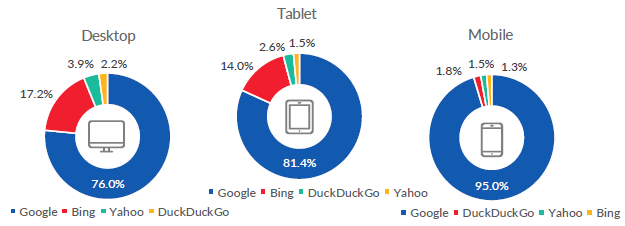
When people think of search engine marketing, most will immediately think of Google; the most popular search engine in the world.
But Google is not the only important search engine out there. In fact, there are certain countries where being aware of the popular local alternatives will be the key to success in your search engine marketing strategy.
Based on the latest stats from the Webcertain search and social report 2024, this blog post will look at six countries where the search engine landscape looks a little different – and where you will need to tailor your SEO and PPC efforts to take into account the local search engine landscape.
Without further ado, let’s dive into it!

1. China
The search engine landscape in China is truly unique. With Google being largely blocked in China due to the country’s so-called “Great Firewall”, a local search engine ecosystem has emerged in its place. The dominant search engine in the country is Baidu, which holds 60.1% of the market share. Bing comes in second place with 16.6%, with Haosou coming in third place with 8.4%.

Baidu is therefore the search engine you need to focus your SEO and PPC efforts on, when targeting the Chinese market. Baidu’s dominance is a result of its superior local knowledge, compliance with local laws and censorship, and a better understanding of the nuances of the Chinese language.
However, with both the search engine ranking algorithm and the advertising rules being different on Baidu compared to Google, you will need to completely localise your strategy for Baidu, as simply copying over your SEO or PPC strategies from Google will not work.
2. South Korea
South Korea is another country with a unique search engine landscape. In South Korea, there are two search engines that should both play an important role in your search engine marketing strategy: Google and Naver.
According to StatCounter, Google has 56.2% of the market share, the South Korean search engine Naver comes in second place with a sizeable 37.4%, and Bing comes in third place with 3.1%.

However, these figures vary significantly depending on the data source, with many other sources, particularly those from South Korea, actually putting Naver as the leading search engine.
Whatever the true break down, one thing is clear: if you are targeting South Korea, it is wise to include both Google and Naver in your SEO and PPC efforts.
Naver will require a totally tailored strategy, as the search engine surfaces content in a totally different way from Google. Compared to Google, Naver displays a lot more information on its first page, including display banner ads, news, shopping ads, stocks, weather and numerous links to its other services.
Naver typically prioritises the visibility of ads, with ads being distinctly separated from organic results. This means that, without advertising, it can be quite challenging to reach users organically on Naver.
3. Japan
Japan’s search engine landscape also looks quite different from what you might be used to. Whilst Google is the most popular search engine, it does not totally dominate the market the way it does in many other countries, with just 77.9% of the market share. Second-place Yahoo Japan commands a respectable 12.9% of the market, with Bing making up another 8%.

However, these stats perhaps diminish the importance of Yahoo Japan in Japan. Whilst Yahoo Japan may only come in second place as a search engine, it is in fact the country’s most popular website. It is perhaps more accurate to describe Yahoo Japan as a web portal, where it meets the needs of Japanese internet users seeking a wide range of information and services.
It would therefore be wise to include both Google and Yahoo Japan in your search marketing efforts in Japan. The good news is that Yahoo Japan uses the same ranking algorithm as Google, and the two search engines also use the same guidelines for the number of headlines, descriptions and character limits in their ads, so you can broadly use the same SEO and PPC strategies for both search engines.
You will of course still need to work with native specialists to ensure you are creating content that resonates both linguistically and culturally.
4. Czech Republic
Heading over to Europe, let’s look at the Czech Republic, where again the search engine landscape looks a bit different from what you might be used to. Whilst Google does come in first place with 81.7% of the search engine market share, the homegrown competitor Seznam comes in second place with 12.2%. Bing comes in third with 4.4%.

Since Google is in first place, it should be the focus of your SEO and PPC efforts. But, with Seznam also accounting for a sizeable chunk of searches done in the country, it is also worth considering Seznam as part of your search marketing efforts.
Regarding SEO, the good news is that Google’s optimisation principles largely work for Seznam too. So, if you optimise for Google, the chances are you will also rank well on Seznam. Like Google, Seznam’s search algorithm is all about the user and content, page titles, meta tags, backlinks, etc.
Regarding PPC, the answer is “it depends”. You will have to check what type of audience and queries tend to be popular on Seznam, if you want to know whether it is worth advertising on Seznam or not. You may find that Seznam works better when it comes to local searches related to local businesses.
5. Belgium
Most people do not think of Bing as having a particularly high market share – but in Belgium, it actually has a surprisingly strong presence, accounting for 18% of searches, behind Google with 80% and ahead of Yahoo with 0.6%.

Since Google is in first place, it should be the focus of your SEO and PPC efforts. But, with Bing also accounting for a sizeable chunk of searches done in the country, it is also worth considering Bing as part of your search marketing efforts in Belgium.
Just remember that Belgium is a multilingual country with three official languages: Dutch, French and German. Dutch is mostly spoken in the north, French in the south and German in the east. You should bear this in mind and conduct research into which language(s) your specific audience speaks when creating and optimising your website and advert content.
6. United States
And finally, let’s cross over the Atlantic to take a look at the United States. At first glance, you may not think that the US search engine market looks that unusual:

However, if we dig a little deeper and break down search engine market share by device type, we see that Bing actually has a surprisingly strong presence on desktop and tablet searches, where Bing’s market share sits around 17% and 14% respectively.

Given the large size of the American online population, that actually translates into a lot of searches, so it may be worth considering Bing as part of your search marketing efforts in this country, alongside Google.
Want to learn more?
If you want more international search engine marketing insights, check out the Webcertain search and social report 2024. The report covers 57 markets from all over the world, making it an ideal read for international digital marketers wanting an easy-to-digest overview of each market. Download your copy for free from Webcertain’s Self-learning platform today!
Data sources
All the stats quoted in this blog post are taken from the Webcertain search and social report 2024, which uses the latest search engine market share data taken at the time of writing from StatCounter.







